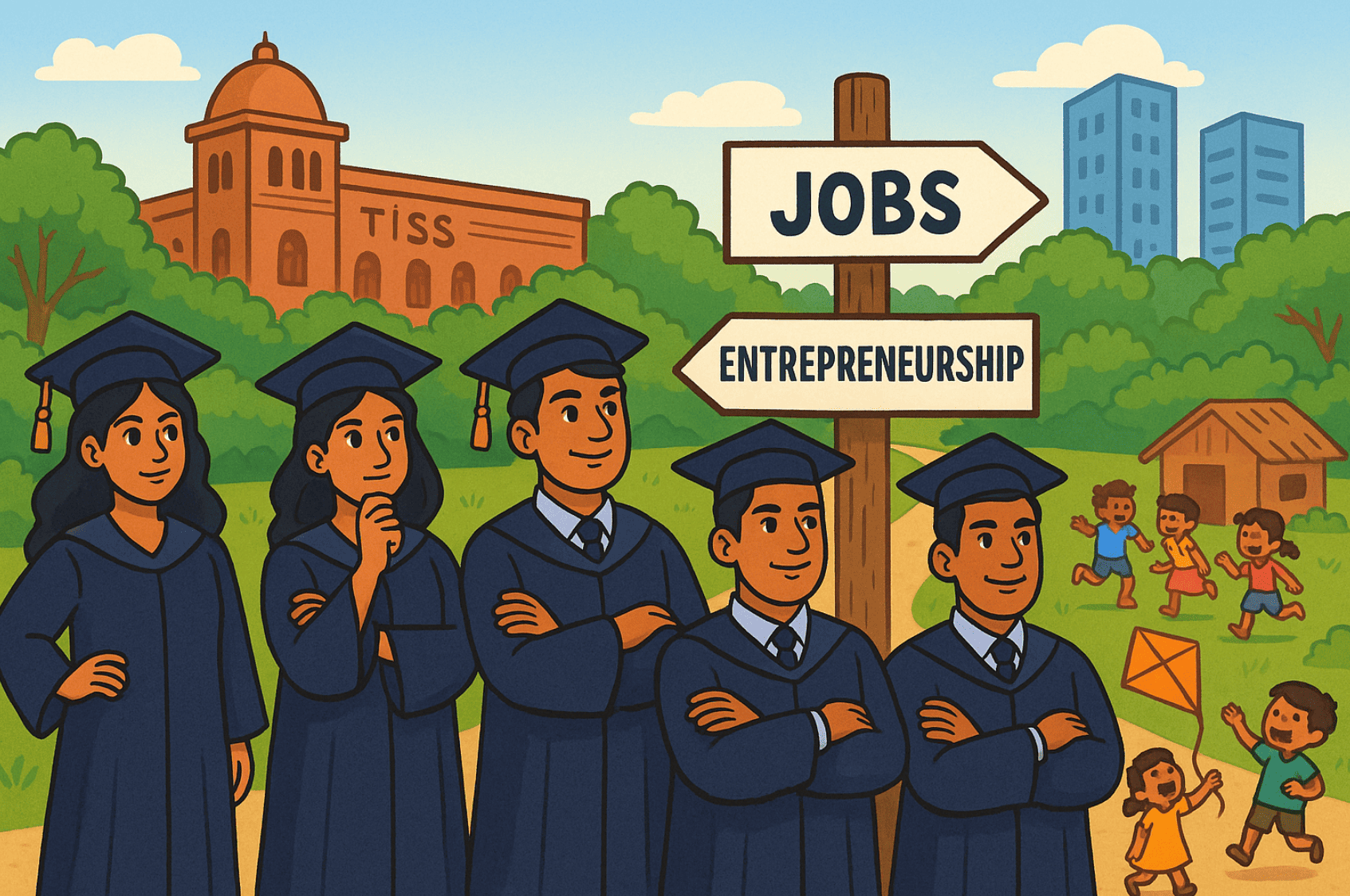
11 May WHY ARE SIE GRADUATES OF TISS TULJAPUR TAKING JOBS INSTEAD OF BUILDING ENTERPRISES?
Banner image generated using ChatGPT, OpenAI, May 09, 2025
Picture this: You are fresh out of the Tata Institute of Social Sciences (TISS) Tuljapur, clutching your Master’s in Social Innovation and Entrepreneurship (SIE). You have spent two years brainstorming ways to change the world, pitching social ventures, and dreaming of launching the next big thing in rural India. But when the time comes to step out into the real world, you and most of your classmates choose a steady job over starting your own enterprise.
So isn’t the whole point of a degree in “Social Innovation and Entrepreneurship” to innovate and become an entrepreneur?
Let’s peel back the layers and discover why these bright minds are choosing the 9-to-5 over the startup grind.
The Dream vs. The Reality
Let’s be honest: Entrepreneurship is romanticized everywhere. Shark Tank, TED Talks, and LinkedIn posts make it look like a thrilling ride of passion, hustle, and overnight success, but for many SIE students, the reality is more like a rickety bus ride on a bumpy rural road-with no Google Maps, no fuel station, and no Wi-Fi.
1. Support Systems: Missing in Action
Starting up isn’t just about having a killer idea. You need mentors, funding, legal help, and a network that believes in you. While TISS Tuljapur gives students a taste of entrepreneurship through pilot projects and events, the real world offers little in the way of incubators, angel investors, or even a co-working space in the middle of Maharashtra. It’s like being taught to swim in a pool, then being dropped into the open sea.
2. The “Salary First” Mindset
Let’s face it: Not everyone has a financial safety net. Many SIE students come from small towns or rural backgrounds, where the family’s hopes (and sometimes debts) rest on their shoulders. The idea of skipping a regular paycheck to chase a risky venture? That’s a luxury not everyone can afford. A stable job means dignity, security, and the ability to support loved ones-sometimes, that’s the real dream.
3. Risk: High, Rewards: Uncertain
Social enterprises are not your typical startups. They’re often built in tough environments, where markets are unpredictable, customers are hard to reach, and profits are slim. The risk of failure isn’t just personal-it can mean letting down a whole community. Many graduates feel more comfortable making a difference from within established organizations, where the impact is real but the risks are shared.
4. Ecosystem: Still Under Construction
In Mumbai or Bengaluru, you can trip over a dozen startup accelerators on your way to get coffee. In Tuljapur? Not so much. The rural startup ecosystem is still finding its feet. Without access to investors, mentors, or even like-minded peers, building something from scratch can feel like shouting into the void.
The Spark Is Still Alive
SIE students aren’t giving up on their dreams. They’re just taking a different route. Events like the National Rural Youth Festival, Gramodaya and InnovateX show that the entrepreneurial spirit is alive and kicking.
For now, many are choosing to learn the ropes, build networks, and save up some capital, so that when they do jump into entrepreneurship, they’ll be ready to swim, not just tread water.
The Takeaway
It is not just about TISS Tuljapur or any other tier 3 region. It is about universities across the country where students graduating from social entrepreneurship programs often find themselves at a crossroads: should they dive straight into building their own ventures, or take up jobs in established organizations? Despite the entrepreneurial spirit these programs nurture, most graduates choose the latter path, and there are compelling reasons behind this trend. For most young social innovators, the prospect of launching an enterprise right after graduation is daunting. Financial barriers play a significant role: starting a business, especially one focused on social impact, requires not only a bold vision but also access to capital, reliable mentorship, and a supportive ecosystem-resources that are not always readily available. Many students also feel the need to gain practical experience, industry exposure, and professional networks before taking on the risks and responsibilities of entrepreneurship.
Family expectations and societal norms further influence these decisions, especially for those from backgrounds where job security is highly valued. In such cases, a stable job is seen as a safer and more responsible first step. Even as social entrepreneurship education encourages innovation and equips students with valuable skills, the institutional support for transforming ideas into sustainable ventures is still developing in many colleges. As a result, graduates often view employment as a stepping stone-a chance to learn, grow, and build confidence before eventually pursuing their entrepreneurial dreams. This journey from classroom to changemaker is rarely immediate; instead, it is shaped by real-world challenges, personal growth, and the gradual building of resources and resilience. In the end, whether they start their own enterprises now or later, these students are laying the groundwork for meaningful impact, one step at a time.
Stay tuned for part 2, featuring solutions to these problems.


